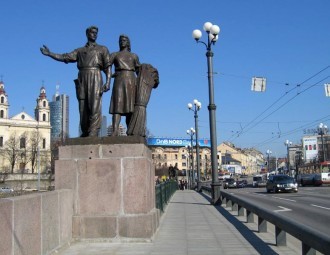Point of view: Belarusan society is not ready to revise Belarus’ role in the Soviet era

Justifying the origins of Belarus’ statehood, official Minsk repeatedly refers to Soviet ideology but alters its interpretation, stressing how Soviets contributed to Belarus’ independence.
On November 7th, President Lukashenka congratulated the nation on a historical holiday - the October Revolution Day. Belarus is the only country in the post-Soviet world that still officially celebrates this Soviet holiday.
It is worth noting that throughout Belarus, bar a few exceptions, communist era monuments and memorials to communist activists can be found, and streets in major cities are generously named after Soviet ‘heroes’. Almost every Belarusan city has Lenin, Marx, Engels, Communist, and Soviet streets, as well as thousands of monuments to prominent Soviet figures. About 70% of monuments in Belarus commemorate Lenin and his deeds and only 9% are of historical and cultural value. In addition, there are Stalin monuments: the "Stalin Line" near Minsk and one 15 km away from the Belarus-EU border in Svislach, a small town, which was erected in 2000 at the discretion of local Communists. In 2009, communists in Minsk started fundraising for a monument to Joseph Stalin in the city. However, the Minsk authorities were not very keen on this initiative and it was abandoned.
On November 1st, Minsk hosted the 35th Congress of the Union of Communist Parties - Communist Party of the Soviet Union with the participation of Communist Party delegates and guests from all over the post-Soviet world. Interestingly, President Lukashenka sent his greetings to the Congress participants, underscoring the importance of fighting “for justice and equal opportunities, a peaceful life, and nations’ right to self-determination”.
President Lukashenka positively assessed the deeds of the Soviet State founders, Vladimir Lenin and Joseph Stalin. In the past, the Belarusan authorities have attempted to depoliticise and strip November 7th of ideological bias. When interpreting the meaning of this holiday, the Belarusan authorities emphasise the positive impact of this historical fact for the Belarusan State. For example, in his speech on November 7th, Lukashenka highlighted the significance of this holiday for the national revival of the peoples in the Russian Empire: “there is no doubt that the events of October 1917 changed the fate of the huge country and created the conditions for the national revival of its inhabitants, as well as for nations to realise their right to self-determination”.
In addition, President Lukashenka offered a new interpretation of this holiday: "This day must be preserved as the day of an interim report to the people. I do not advise politicising this holiday, we should rather think about the practical aspects – building new bridges, houses, enterprises. This is the main point that we make with the celebration”.
However, Belarusan society has mixed feelings about the November 7th celebrations. Currently, there are two political parties in Belarus which follow communist ideology – the pro-governmental Communist Party of Belarus (CPB) and the opposition Leftist Party ‘Fair World’. The CPB (unlike the Fair World Party) is represented in Parliament (six seats) and in the local Councils (320 local Deputies) and its members occupy high positions in the local executive authorities.
In addition, there are several public initiatives and projects in Belarus whose goal is to de-communise and de-sovietise Belarusan society. The Belarusan authorities neither help nor hinder their activities.
In the near future, the Belarusan authorities will not consider starting the process of de-sovietisation in society or stripping the state ideology of its Soviet legacy. The Belarusan leadership will, however, continue to adapt the Soviet ideological legacy in order to justify the origins of the Belarusan statehood.
The article was originally published at Solidarity with Belarus Information Office
-
03.01
-
07.10
-
22.09
-
17.08
-
12.08
-
30.09



























